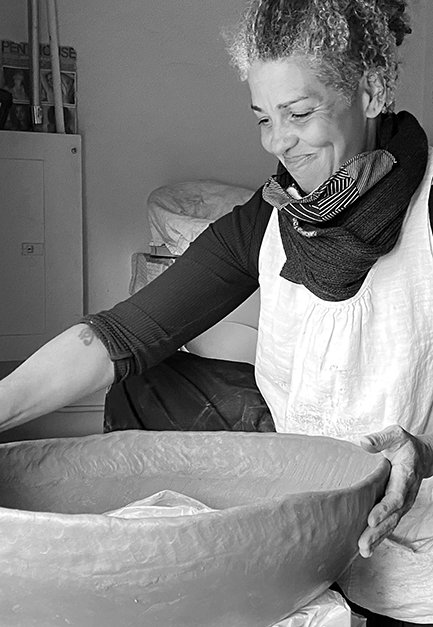Alisabeth Brown, based in Santa Fe, New Mexico, isn’t just an artist—she’s a force of movement and matter. Born into the buzzing creative landscapes of Los Angeles and New York City, Alisabeth’s journey through art started with her body before it moved into her hands. From age 5, she danced. For over 16 years, her life was shaped by the rhythm of modern dance.
A Shift from Performance to Process
Though she dreamed of becoming a professional dancer, Alisabeth Brown felt limited by the rigid expectations of predominantly white institutions. Rather than conform, she transformed—redirecting her love for discipline, grace, and exploration into new creative languages.
Dance as Foundation, Not Destination
Modern Dance as Artistic DNA
Dance gave Alisabeth a deep understanding of space, timing, and flow. The rigor she once applied to rehearsals now fuels her work in the studio. Her connection to the human body still pulses through her sculpture and design—just in a different form.
Problem: The Institutional Constraints of Dance
Institutions often narrow what dance should look like—and who gets to lead in that space. For Alisabeth, fitting in wasn’t the goal. Belonging wasn’t found on stage but in the raw material of artistic curiosity.
Solution: Freedom through Cross-Disciplinary Practice
Her background in movement became a compass. Now, instead of choreography on a stage, she choreographs clay, glass, and light—each piece a performance captured in physical form.
The Shift to Sculptural Storytelling
A Deep Dive into Ceramics
For over 30 years, Alisabeth Brown has been molding clay into organic, flowing shapes. Her biomorphic sculptures speak like ocean waves—soft, ancient, and coded in mystery. This isn’t just craft. It’s memory, translated.
Biomorphic Forms and Oceanic Memory
Her pieces feel like they come from under the sea—each curve, each ripple, a whisper in a language we’ve forgotten. The clay remembers what we’ve lost. It tells stories we never knew we knew.
New Light: The Exploration of Kiln-Formed Glass
Color, Transparency, and Time
More recently, Alisabeth has moved into the world of kiln-formed glass. These works shimmer with multi-layered color and shifting transparencies. When light passes through them, it’s as if time itself becomes fluid.
Problem: Balancing Structure with Fluidity
Glass is exacting—less forgiving than clay. But rather than fight the form, Alisabeth lets it teach her. She listens to the heat, the pressure, the tension.
Solution: Letting Light Be the Guide
Her glasswork doesn’t just hold light. It moves with it. It plays, bends, and dances—just like the artist herself once did.
Art as Exploration, Not Completion
Experimentation over Finality
Whether it’s a clay sculpture or a panel of glass, Alisabeth never rushes to finish. Her process is about discovery, not outcome. Each project is a question, not an answer.
Freedom in Material Choices
For her, materials are more than tools—they’re co-creators. She doesn’t force them. She follows them. This is where the soul of her work lives—in the in-between.
A Voice That Blends Past and Present
Cultural Threads in Her Work
There’s something ancient in what she makes. It’s not overt. It’s not literal. But it’s there—in the shapes, the shadows, the stories. She stitches history into modern form.
Memory as Medium
The past and present don’t clash in her work. They flow. One breathes into the other. Her sculptures feel like echoes, while her glass feels like glimpses—both familiar and mysterious.
The Santa Fe Studio: Space to Create
A Home for Movement and Stillness
Now rooted in Santa Fe, Alisabeth has found a creative home. The landscape, rich with color and silence, feeds her process. It gives her room to think, to try, to start again.
The Power of Process over Perfection
How She Defines Success
Success isn’t the gallery. It’s not the spotlight. It’s the work. The hours in the studio. The struggle with form. The thrill of finding something new.
Legacy of Freedom and Form
What Alisabeth Brown leaves behind won’t just be beautiful objects—it’ll be a reminder that we don’t need to fit in to stand out.
Conclusion: A Life Shaped by Movement, Molded by Matter
From the disciplined steps of a young dancer to the flowing lines of ceramic and glass, Alisabeth Brown has lived a life in motion. Her journey is a story of transformation—one that pushes past limits and into boundless experimentation. She doesn’t ask the material to obey. She asks what it can become. And through that dialogue, she gives us work that feels alive.
FAQs
1. What kind of art does Alisabeth Brown create?
She works across sculpture, kiln-formed glass, ceramics, and design—rooted in movement and organic form.
2. How did dance influence her current work?
Dance gave her discipline, spatial awareness, and a deep connection to flow—all of which show up in her sculptures and glasswork.
3. What is biomorphic sculpture?
Biomorphic means life-like. Her clay sculptures mimic natural shapes, like waves or shells, evoking memory and nature.
4. Where is she based?
She currently lives and works in Santa Fe, New Mexico, after spending her early years in Los Angeles and New York City.
5. What makes her glass art unique?
Her kiln-formed glass features multi-layered color and light movement, blending modern design with a sense of mystery and memory.

